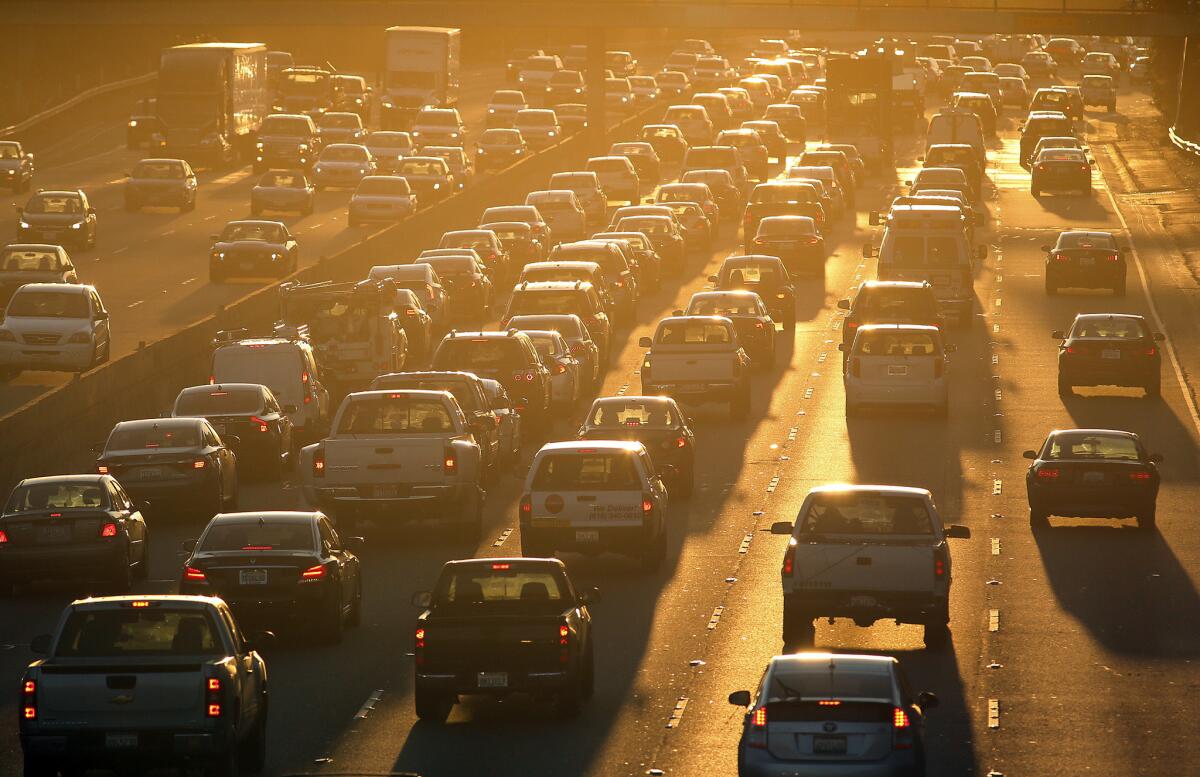Opinion: California sues, again, to protect the planet from the Trump administration

- Share via
California and 22 other states are taking the Trump administration to court — again — in an attempt to block President Trump’s foolishly destructive effort to weaken fuel economy standards.
Since he took office, Trump has been on a mission to roll back the Obama-era fuel efficiency regulation that was the nation’s most important effort to cut automobile pollution, reduce oil consumption and fight climate change. The U.S. Environmental Protection Agency and the Department of Transportation finalized the so-called Safer Affordable Fuel Efficient (SAFE) Vehicles rule in March. California and other states, along with environmentalists and public health advocates, all vowed to sue to block the change.
But there might be some good news amid the bad intentions. The Trump Administration’s sloppiness, obfuscation and rush to adopt the rule may have made California Atty. Gen. Xavier Becerra’s job a lot easier.
According to recent news reports, the EPA and DOT ignored warnings from staff about the legal justification for the rollback and left errors in the analysis that could make the rule vulnerable to lawsuits.
EPA career staff raised concerns about flawed analysis and false statements in the final draft rule earlier this year, but those warnings went unheeded, the Washington Post reported. According to the Post, the top EPA official in charge of setting fuel economy standards warned that the final rule, written largely by the DOT, did not address more than 250 comments by EPA experts and that its inaccuracies would make the rule vulnerable to legal challenges.
Making matters worse, the Trump administration left documents outlining staff concerns out of the rule-making filings. That sure makes it look like EPA political appointees were trying to hide staff concerns about the legality of the rules, Sen. Thomas R. Carper of Delaware, the top Democrat on the Environment and Public Works Committee, wrote in a letter to the EPA inspector general. The Trump administration also may have violated federal rules that require all relevant materials be made part of public docket, Carper wrote.
And it wasn’t just EPA staff raising concerns. Economists in the White House Office of Management and Budget warned the legal justification for the rollback was lacking an “actual justification,” according to documents reviewed by E&E News. The OMB staff, who regularly vet draft rules, also raised doubts about the cost-benefit analysis underpinning the rollback.
The rule significantly weakens the standards adopted in 2012 as part of the federal government’s bailout of the financially troubled auto industry. The original standards called for automakers to increase fuel economy across their fleets by about 5% per year, reaching an average of 54 mpg by 2025. Automakers were expected to meet the target by developing more hybrid and electric models, gradually cutting smoggy tailpipe pollution and greenhouse gas emissions in the process.
The new Trump rule, however, would require automakers to increase fuel economy by only 1.5% a year, reaching an average of 40 miles per gallon by 2026.
EPA Administrator Andrew Wheeler has claimed the new rule would improve fuel economy among cars and trucks, reduce air pollution and make new vehicles more affordable. But the administration’s own analysis found that, compared to the previous rules, the rollback would increase the carbon emissions fueling global warming, increase oil consumption and potentially cost consumers more on gasoline over the life of their vehicles.
Congress has repeatedly passed transportation and environmental laws that require the U.S. to conserve energy, maximize fuel economy, clean the air and reduce greenhouse gas emissions. The Trump administration shouldn’t get to rewrite the rules by ignoring the experts and conducting its own shoddy analysis.
More to Read
A cure for the common opinion
Get thought-provoking perspectives with our weekly newsletter.
You may occasionally receive promotional content from the Los Angeles Times.











